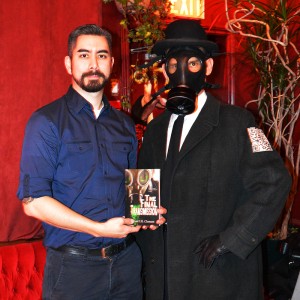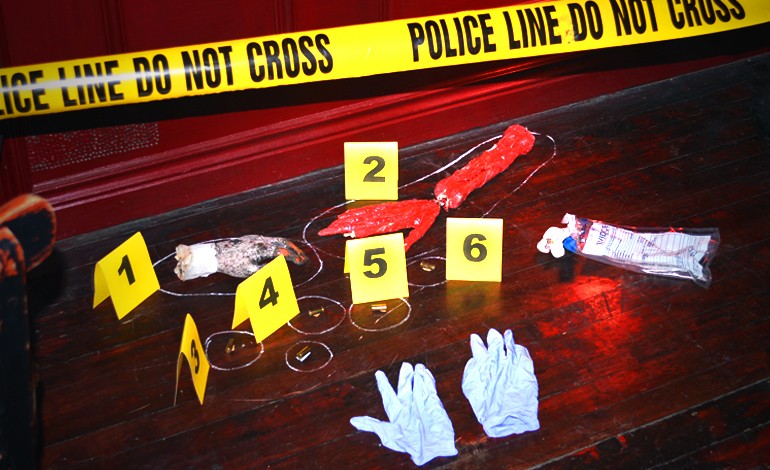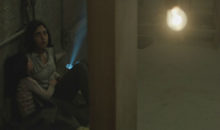Crime, Conspiracy & Cranberry Juice: My Evening with Brian Clement
When you first meet Brian Clement, he comes across as a very quiet, understated man with little to say about his accomplishments. Originally from Victoria, BC, Clement made his name in the zombie-movie business before moving to Toronto around 2009. Since then, he has written screenplays, made other movies and short films, and can add ‘Published Novelist’ to his impressive roster of accomplishments.
Having taken an idea of his from a screenplay written a few years ago and rewriting it as the first in a three part novel series, Clement has established himself in the horror/sci-fi genre of literature. While his work does contain echoes of the genre that made him famous, Clement has incorporated other themes and devices in order to tell a different type of story.
His book launch, held in Toronto on the second floor of Tequila Bookworm, was well-attended. The floor was packed with fans, friends, family and those eager to meet an author. Clement had prepared well in his usual careful way: a mini-crime scene was set up in one corner and an actor was garbed in the same accoutrements as the menacing figure in the book. With two readings scheduled, lots of photos, loud music, and a full room, Clement was in his element.
I had an opportunity to sit and chat with him before the madness.
GEEKPR0N: You’re a writer, a producer, a director, you do makeup costuming, sound, you’re a jack-of-all-trades. Why horror? What is about the genre that attracts you?
Brian Clement: I got started on it about thirteen years ago. There’s a friend of mine, Nick, who set me on the path of low-budget horror because we wanted to work on a film. He said that this was a good way to get in to indie film because you don’t need a lot of money. He kept showing me these really old trashy zombie films from Italy and I watched them and said yeah, we could do that. So we put together a zombie movie in 2000 called ‘Meat Market’ and things just kind of rolled from there. I guess from a thematic standpoint, it’s an easy way to express socially critical ideas, in a forum that makes it more fantastic so it’s easier to express and you can get these ideas across without hammering it into someone’s head and it can be more of a subtext or metaphor.
GP: So essentially, since you’re dealing with the same types of subject matter, it’s pretty easy to get that message across.
BC: Exactly.
GP: Tell me about your experiences with directing.
BC: I really like the organization aspect of it; I like bringing talents together to put together an artistic goal. Over the years I’ve learned to be really patient with different personalities on set and different types of people, and dealing with uncontrollable delays: dealing with the fact that there are certain things that can’t be controlled and learning to accept that. In that sense, it’s helped me grow as a person. I’d like to think that I’ve integrated into my personality all the best aspects of it.
GP: With all those different experiences from directing that you’ve pulled out and meshed with your personality, what specifically did you pull from those experiences when you started writing the book?
 BC: Creatively, it’s much the same process; writing just involves a lot less people. It’s just me, I don’t have to worry about other people’s schedules. In a sense, it’s creatively a similar kind of endeavor, it’s a similar time commitment. The discipline of taking the time every night to work on the same project is definitely something I would draw from directing. When I would write a film and realize that it was too far beyond my budget; I didn’t have to worry about that writing a book I could just write whatever I wanted and let my imagination spill out. The only restrictions being editing, story length, superfluous material or whatever. In terms of drawing from my film experiences, I’m more creatively expressive in this process, I can have more freedom to do whatever I want without the restriction of a budget or time constraints, scheduling or actors or anything like that.
BC: Creatively, it’s much the same process; writing just involves a lot less people. It’s just me, I don’t have to worry about other people’s schedules. In a sense, it’s creatively a similar kind of endeavor, it’s a similar time commitment. The discipline of taking the time every night to work on the same project is definitely something I would draw from directing. When I would write a film and realize that it was too far beyond my budget; I didn’t have to worry about that writing a book I could just write whatever I wanted and let my imagination spill out. The only restrictions being editing, story length, superfluous material or whatever. In terms of drawing from my film experiences, I’m more creatively expressive in this process, I can have more freedom to do whatever I want without the restriction of a budget or time constraints, scheduling or actors or anything like that.
It’s more immersive, I don’t have to write a script or think about how I’m going to shoot it, or how I’m going to schedule it or what actors I can use. I can just immerse myself in the story and let the ideas flow out and write whatever I feel like. I can just sit there and write for 2-3 hours straight and I don’t have to worry about future considerations down the road.
GP: For this particular story, why a novel format? Why not a short film, or a graphic novel?
BC: Well, here’s the story: I originally wrote this as a screenplay in 2009 and it just sat and collected dust for about two and a half years. I really wanted to write something that would fulfill all these sci-fi, horror, conspiracy themes that I’ve never seen in a film before. I looked at it and I said, ‘I’m just going to write and be super expressive and not care about budgetary constraints, I’m going to write whatever I feel like.’
So that’s how I wrote the screenplay. I looked at it and thought, I’m going to need a multi-million dollar budget for this, so we shot a chopped-down, truncated version as a short film. It didn’t really turn out the way I wanted it to; it had similar story elements and was called ‘Project Breakwater’ and is available online in chapters. I went back to the original screenplay and decided to take the whole thing and rewrite it completely as a book. I went back to some original ideas and wrote it out to be about 300 pages, went through the editing process and started sending it out to publishers. The third one I sent it to — took it.
GP: Do you have any plans to revisit the film?
BC: If by some magical chance or fate, someone comes along and says ‘I read your book and think it would make a great movie’, we’d sit down and talk about making it into a film, then yeah, of course.
GP: Part of the inspiration for ‘The Final Transmission’ came from your film ‘Dark Paradox’ which deals with Elder Gods in a more Lovecraftian way. What themes or subject matter did you pull from ‘Dark Paradox’ in terms of inspiration?
BC: It continues some of the storyline elements from ‘Dark Paradox’, which is a film I made in 2007 and produced by a company in the UK. I pulled some elements from it: the idea of this writer going crazy, a book of evil. I took some of those ideas and incorporated it into the story as though it were a continuation. It’s not a direct sequel but a lot of those things are meant to have happened. ‘Dark Paradox’ is like a back story. So it’s not a direct sequel, it’s more of a continuation of a similar storyline.
GP: In your current projects, the underlying thread is conspiracy. Do you personally subscribe to any conspiracy theories?
BC: No, no, I consider myself to be a very level-headed rational person. I try to be objective and balanced in perspective and I try to take in all sides of an argument and I especially dislike when people… I can always tell when an argument makes no logical sense and it frustrates me because I don’t buy into conspiracy theories. They so often rely on scant evidence or hearsay or personal feelings or truly subjective information. I’m never going to believe in something like that without something really convincing. I think the burden of proof is on the people who have an extraordinary experience. In the book, I like to use it as a device: it’s great way to create tension, it’s a great way to get your characters to explain ideas, and get all these social, political criticisms out. In real life, not so much. Works really well in fiction, though.
GP: I think it’s really interesting that you chose that device and use it so effectively. Others have tried and haven’t succeeded as well as you have with this project.
BC: In the book, there really is a conspiracy, multiple conspiracies, but that’s the story.
GP: Exactly. The characters are on a journey, so they need to figure that out, but in real life…
 BC: In real life, I’m not going to buy into something unless… I just don’t see the need to give yourself over to a belief system. I would never call myself a ‘something’, an –ism of whatever. All belief systems have something to contribute, something of value. I would never want to restrict myself to a certain framework because it can be very constraining. I would prefer to take in different ideas and try to come up with a balanced perspective.
BC: In real life, I’m not going to buy into something unless… I just don’t see the need to give yourself over to a belief system. I would never call myself a ‘something’, an –ism of whatever. All belief systems have something to contribute, something of value. I would never want to restrict myself to a certain framework because it can be very constraining. I would prefer to take in different ideas and try to come up with a balanced perspective.
GP: The book is tied to something you’ve previously filmed, and you’ve already said that you would film it if someone approached you. Is that something that you are actively looking into?
BC: I definitely don’t want to focus on it, it would be more of a back-burner thing that I would leave there until something like that came up. I’ve kind of moved on creatively from it. I wrote a screenplay, I made a short film out of it, I wrote a book out of it, I’m kind of moving on to the next chapter.
GP: The next chapter being the next book?
BC: (laughs) Yeah. The first one ends on a note where it seems like it could be very cynical or hopeless. I don’t want to spoil anything but at the same time it leads into something very different. There’s meant to be three storylines: the first one is set in our current world, slightly in the future. The next one is set 25 years past that, and the other that’s over a century in the future. They all represent different stages of change.
GP: So there aren’t any recurring characters.
BC: I’m not saying anything.
GP: Fair enough. You’re already working on the second book?
BC: Yeah, I have the storyline mostly finalized. I’m about three quarters of the way through that and will start actually writing next month. I’ve been busy editing my web series, so I haven’t had time to write. Up until last month we were editing the book, and then getting ready for the launch and publicizing the book, so that has taken up all my time. Next month, I can finally get back to just writing.
GP: Will your trilogy follow the standard formula?
BC: (laughs) No, no, not at all because the stories are so different and set so far apart. Without going into too much detail, the first one is a political, horror, conspiracy, sci-fi thriller. The second one would be sci-fi, horror, post-apocalyptic cyber-punk kind of thing. The third one will be much more sci-fi because it’s going to be set mostly in space. It will have horror elements but more as a background. I guess it represents my personal growth in that I’ve definitely moved away from horror recently. I used to make zombie movies, movies with cannibals and stuff like that. Now it’s more sci-fi influenced. I would consider my web series ‘Improbabilia’ to be straight sci-fi with horror elements to it. ‘The Final Transmission’ has been classified as horror thriller by my publishers: I would say that it starts off as horror and evolves into sci-fi by the end of the book.
GP: Why the switch from horror to sci-fi?
BC: Personally, I’ve always loved science fiction. It was my first love as a kid and it’s something that I’ve wanted to get back to. As much as I love horror, I’ve found that people have very strict expectations of what they want to find in the genre and if it doesn’t meet that expectation they’ll say, ‘This isn’t horror’. I think sci-fi fans are a bit more open to something being really weird, and totally off the wall and have weird elements that they’d never expect. Not to demean horror fans in any way, but they want to see certain things in their horror movies and they are very particular about what they want to find there. If I don’t deliver it, then maybe they’ll say that it isn’t true horror. I wouldn’t want to restrict myself to any particular genre and say I’m a genre director of whatever style.
GP: But that’s the danger, though isn’t it? By doing the same type of thing, you end pigeon-holing yourself.
BC: Precisely. When I lived in Victoria, in interviews they would refer to me as ‘Zombie director Brain Clement’ so I knew that it was time to move on and start doing something different.
GP: Was that part of the reason or moving to Toronto?
BC: Among other things, yes. I still love my home town, though.
GP: Let’s talk about the web series. It also centers on a conspiracy, this time medical.
BC: It’s sort of a biographical element of me. A couple of years ago, I was between jobs and I signed up for paid medical testing so I could buy a camera. I went through the whole testing thing. Very loosely based on my experience with paid medical testing is the genesis of ‘Improbabilia’, where a guy loses his job and goes for paid medical testing. In his case, he develops strange abilities and hooks up with an underground movement of other mutants who are all being chased and shadowed by a sinister organization. With ‘Improbabilia’, I just thought that it was such a great idea, I’m going to put it together as a web series. I just started writing it last January and had it written in six weeks. Went into pre-production and started shooting in April of last year, finished shooting in July, and then I’ve been editing and publicizing and putting them on the internet since then.
GP: One last question: Star Wars or Star Trek?
BC: I like them both but I’m going to have to go with Star Trek. I like the more exploratory aspects of it and that it’s set in a supposedly real future in that it’s set on Earth and it’s very hopeful and optimistic. I would project Star Trek as something my descendants would go and do whereas Star Wars can’t ever exist in reality.
Brian Clement’s novel ‘The Final Transmission’ is out now and available online here. To learn more about Brian, visit his website.
Check out his web series ‘Improbabilia’ here.







